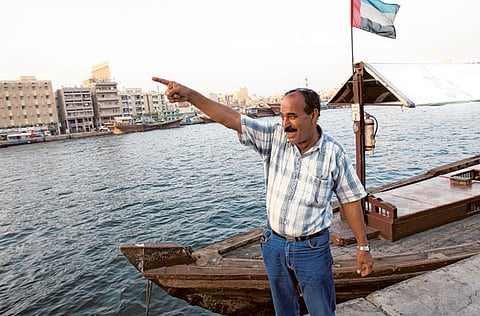Dubai is my heart, says man who grew with UAE
Expatriate recalls a time when there were few roads and he didn’t require a visa

Dubai: When Arsalan Padidar’s dhow docked on the banks of the creek in 1969, he knew there was no turning back. Dubai then held so much promise to the 18-year-old from Bandar Abbas, Iran.
But nothing prepared him for the emirate’s transformation decades later. “Life then was like living in another world completely,” Padidar, 60, told Gulf News looking back at his time in the UAE as the country prepares to celebrate its 41st National Day on December 2.
While taking a stroll along the Bur Dubai side of the Dubai Creek which he first set foot on 43 years ago, he added: “You cannot compare life now with life back then; it is like heaven and earth.”
Padidar recalls the entire stretch of the creek used to be dotted with small huts. There used to be stone houses too but very few of them. “I was working as a truck driver in Iran and I was earning 50 toman. When I came here, I was told I could get 100 toman. So that’s the reason why I stayed,” he said. At the time, he could visit Dubai without a visa or passport but couldn’t stay longer than 24 hours.
“When I came here, there were no roads, it was all sand. So I went looking for my relatives who took me to a car and drove on roads that crisscrossed each other,” he said.
Working at a small concrete block factory, Padidar vividly remembers how most items of everyday use were handcrafted. Life was hard but things took a different turn by 1971 when the UAE was formed.
After getting his passport in Iran that year, Padidar came back to the UAE through Dubai airport. “There was no visa or anything. They just took my passport and allowed me to go. And they told me, if you find a job, bring your sponsor and I will give you your passport back.”
Even officials issuing a driver’s licence were “lenient” at the time, he recalls. “It was completely desert, off-road [environment]. The examiners would observe how you drove. If you didn’t get stuck and you drove properly, they’d give you a licence,” he said, adding that he spent Dh20 to get his licence.
The father-of-four got a job as a truck driver for a salary of Dh2,500 per month including overtime.
“It would take five hours to reach Abu Dhabi because of the road. The road was too narrow, you had to carefully drive, otherwise your side mirrors could be hit by oncoming vehicles,” he said.
After working for two years, Padidar went back to Iran with his earnings of two years intact — Dh60,000 — which he used to buy a house for his family.
He said he saved money by surviving on tips from customers and spent just about Dh25 on food. To save on rent, he and most of the low-income workers he knew in Dubai at the time slept under the stars. “I didn’t have to spend anything on food or rent. We had no house to pay for, as we slept outside. There were no rooms. We still slept on the concrete blocks at night; sometimes on the blocks, sometimes on the sand,” he said.
Development projects started off slowly. He witnessed the Shindagha Tunnel open in 1975, and construction of more road networks and buildings followed. “When I first came, I wanted to work for some years to earn money and go back to Iran and do something there. But when I started working here, things started slowly changing which made me stay here. Now, I have stayed in Dubai more than I have in Iran.”
Now employed as a truck driver with a company in Jebel Ali, Padidar said he could not give a definite answer on when he plans to retire and go back to Iran. “Dubai is my heart. I want to retire but I still don’t have the heart to leave. In case they cancel my visa, I’ll go back home but I’ll come back to Dubai for a visit and see how it’s developing.”


